When your product roadmap is packed, your in-house team is fully booked, and deadlines are non-negotiable, you’re caught in a frustrating cycle: to scale capacity, you need more Python developers, but you need more capacity just to hire them.
Yet, some of the fastest-growing tech companies, including Slack, WhatsApp, and Google, solve this exact problem not by hiring more, but by outsourcing smarter.
Whether you’re launching an MVP, scaling a SaaS platform, or trying to hit your next release milestone, outsourcing can unlock speed, flexibility, and deep technical expertise without the overhead.
In this guide, we’ll show you:
- Why top tech startups and enterprises outsource Python development
- What Python projects you can outsource safely
- A proven 6-step outsourcing framework used by Syndicode clients
- How to pick the right partner and avoid common pitfalls in Python software development
No fluff, just the clarity and structure you need to make an informed, strategic outsourcing decision.
Why top tech companies outsource Python development (and see 2x faster delivery)
1. Faster launches, no hiring bottlenecks
Python development outsourcing lets you skip the hiring queue and get a team started within weeks or even days instead of months. This allows businesses to launch products faster, meet critical release deadlines, and shorten product iteration cycles.
2. Access specialized skills when you need them
Need a senior Python developer with AI/ML expertise? Or someone who’s built high-load marketplaces before? Outsourcing gives you access to vetted talent without long recruitment cycles.
You avoid skill gaps, scale with deep expertise rather than generalist support, and tap into cross-industry knowledge you may not have internally.
3. Scale up (or down) without long-term commitment
You don’t always need to grow your internal team, especially when you’re experimenting, validating a product idea, or facing short-term delivery pressure. Python development outsourcing gives you the flexibility to add engineering capacity without increasing headcount, reduce risk when pivoting, and stay agile during changing business conditions.
4. Cut overhead without sacrificing quality
Hiring, onboarding, payroll, benefits, and hardware: all of that disappears with outsourcing. You get skilled Python specialists without adding pressure to your HR and operations teams, allowing everyone to focus on outcomes, not logistics.
Moreover, when outsourcing, you pay for the time actually worked, which can significantly reduce both the cost per deliverable and the cost per hour in the long term.
5. Gain process maturity and external perspective
Established outsourcing companies bring more than just hands on deck; they bring proven delivery workflows, agile practices, and product discipline. You avoid reinventing the wheel, benefit from industry-tested processes, and get guidance if you need it, not just code.
For teams moving fast, this added maturity can help improve quality, predictability, and collaboration from day one.
How much you could save with outsourcing?
Book a free estimate call with our team. We’ll walk through your project requirements, ask the right questions, and prepare a personalized cost estimate based on your specific needs—no guesswork.
Get estimate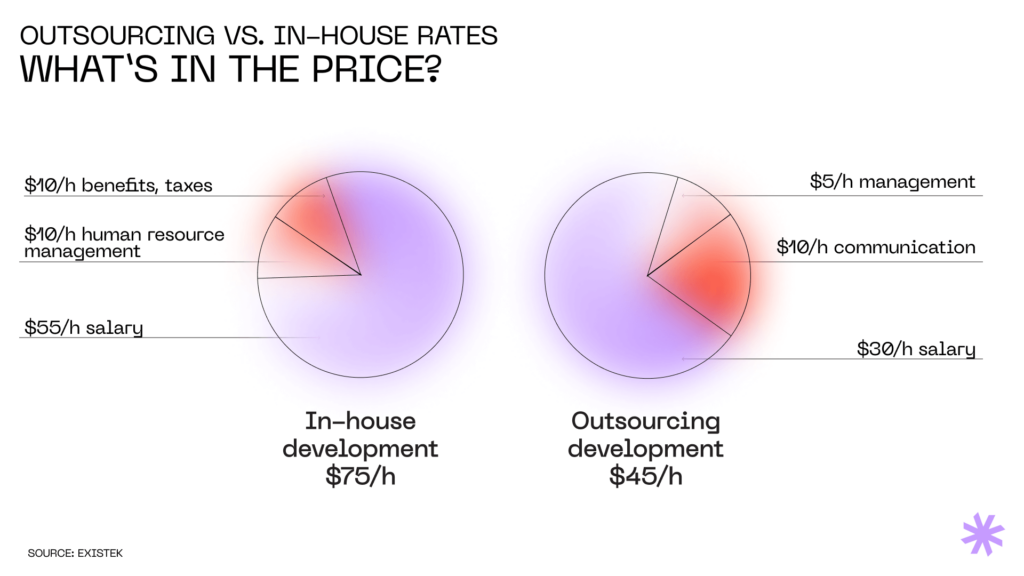
When to outsource Python development?
Every business that turns to outsourcing has its own unique reasons for getting there. But here are the most common and strategic moments where outsourcing Python development can give you the momentum you need:
You need access to specialized talent you can’t find (or hire fast enough)
Outsourcing Python development gives you access to a worldwide network of experienced, highly skilled professionals. You get not just generalists, but software development engineers with deep experience in the specific technologies your product depends on.
This is especially valuable if you’re operating in a competitive hiring market or need niche expertise in areas like AI, machine learning, or scalable backend systems. Outsourcing lets you sidestep local talent shortages and hire proven Python specialists without the delays of traditional recruitment.
You want to reduce overhead without sacrificing quality
Outsourcing allows you to engage experienced Python developers on a project or hourly basis, without the long-term financial burden of full-time hires. You avoid costs like benefits, infrastructure, and onboarding, while still maintaining full control over output and quality.
Additionally, outsourcing to regions with lower labor costs lets you build more with the same budget or invest in areas that drive growth.
Read also: How to estimate the cost of custom software development?
You need more hands on your project—fast
Outsourced Python experts are typically ready to join your project in days, not months. That speed can make a big difference in the web development process when you’re racing to meet a release deadline or trying to recover from project delays.
What’s more, outsourcing partners bring pre-tested workflows, toolsets, and onboarding processes. This means that the outsourced team can start contributing productively almost immediately. With expert guidance, you reduce the risk of costly errors and accelerate time-to-market.
You need technical guidance, not just execution
If your internal team is unfamiliar with Python or you simply want to ensure best practices from the start, Python development outsourcing gives you access to senior Python experts who’ve solved similar problems before.
They can audit your codebase, recommend architectural improvements, reduce technical debt, and help your team level up in areas like performance, microservices, or machine learning implementation. This is especially useful if you’re building a critical product and can’t afford missteps in the foundation.
Your project involves complex or unfamiliar technical challenges
Not every team has the time or in-house expertise to solve every challenge. Outsourcing Python development connects you with engineers who’ve worked across industries, frameworks, and architectures and can offer insight-driven solutions to problems you’ve never faced before.
Additionally, Python development outsourcing gives you access to teams that stay up to date with the latest tools, libraries, and security practices. This helps ensure that your project benefits from robust, future-proof implementations.
What Python projects can you outsource?
Python’s flexibility makes it ideal for a wide range of projects, from product MVPs and AI solutions to automation and infrastructure management. Outsourcing these Python projects can give you faster results, lower overhead, and access to skills that may be hard to hire in-house.
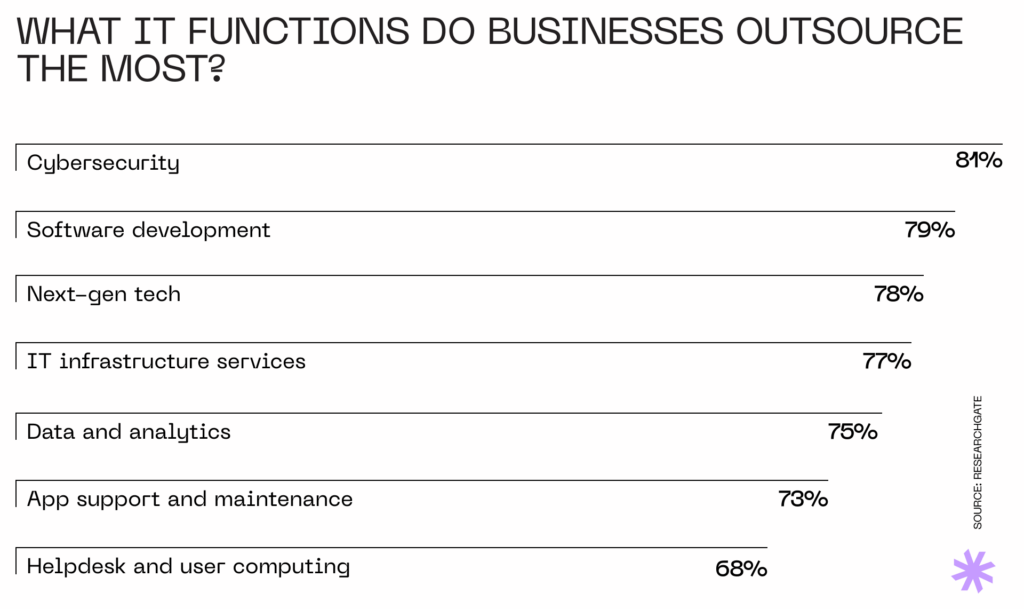
Web and mobile app development
Outsourcing Python development allows you to build robust, scalable web and mobile applications without the high overhead of expanding your core team. You gain:
- Access to experienced Django, FastAPI, and Flask developers
- Faster development cycles thanks to proven workflows
- Significant savings on hiring, training, and infrastructure
For time-sensitive projects or MVPs, outsourced teams help you reduce time-to-launch and gain a first-mover advantage without sacrificing quality.
Data analysis and processing
Your need for data analysis likely spikes at key phases: product validation, user behavior analysis, and reporting automation. With Python development outsourcing, you scale up your data capabilities only when needed.
Outsourced Python experts bring:
- Experience with tools like Pandas, NumPy, and Apache Spark
- Access to modern data infrastructure and visualization tools
- Flexible engagement, so you don’t pay for idle time
This gives you insight without the overhead—a win for product and growth teams alike.
AI and machine learning development
Hiring in-house AI/ML talent is expensive, competitive, and often impractical for early- or mid-stage companies. With Python outsourcing, you can:
- Bring in top-tier AI/ML development experts with real-world TensorFlow, PyTorch, and scikit-learn experience
- Customize prebuilt models to solve domain-specific problems
- Speed up prototyping and reduce algorithm risks
Whether it’s recommendations, automation, or predictive analytics, outsourcing to an experienced Python development company helps you move from idea to production faster and safer.
Automation and scripting
Manual workflows slow you down and increase the risk of errors. Python is perfect for scripting and automation, and outsourcing helps you act on those opportunities immediately.
A Python development outsourcing partner can:
- Automate repetitive tasks (reporting, data transformation, infrastructure operations)
- Build custom scripts or microservices tailored to your workflow
- Bring industry-specific insight to streamline your operations
The result? More efficiency in the development process, less manual work, and a faster-moving team.
DevOps and cloud infrastructure automation
Building in-house DevOps capacity takes time and budget; yet cloud setup, CI/CD pipelines, or environment automation often require specialized expertise.
Outsourcing DevOps to Python experts allows you to:
- Spin up infrastructure-as-code solutions faster
- Ensure security and reliability from day one
- Avoid long-term overhead for short- to mid-term needs
With a good Python development company as a partner, you’ll reduce the risk of outages, improve deployment velocity, and maintain budget control. All without growing your headcount.
Legacy system modernization
Migrating from outdated tech is complex and risky, especially if your team hasn’t done it before. Outsourcing this work to a Python development team ensures a smoother path forward.
You get:
- Engineers experienced in modernizing monoliths, migrating data, and rewriting core logic
- Minimized downtime and data loss
- Long-term support options post-migration
It’s a cost-effective way to de-risk modernization, align with modern web development standards, and unlock new business opportunities.
Need Python experts fast?
Scaling your team shouldn’t slow you down. Get instant access to top-tier Python talent without the hiring hassle. Let’s talk and start building your team today.
Hire nowHow to choose the right Python outsourcing model
Outsourcing isn’t one-size-fits-all. The right collaboration model depends on your goals, internal capacity, and how much control you want to retain.
At Syndicode, we offer flexible cooperation models tailored to your Python development project’s stage, scope, and pace, whether you need a single developer or an entire cross-functional team.
Here’s how each one works:
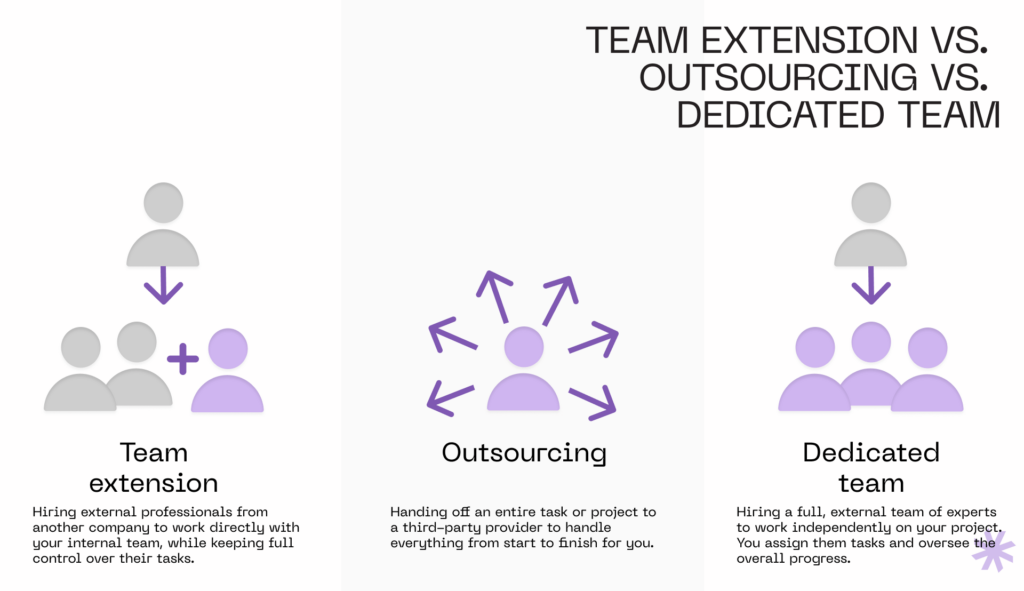
End-to-end Python development services
With this model, a software development company takes full ownership of your Python-based project from discovery and architecture to development, deployment, and support.
It’s the best choice when:
- You lack internal technical resources
- You are ready to fully delegate delivery to a web development partner
- You’re building a complex product like a SaaS platform, ML solution, or enterprise tool
We assemble the Python development team, manage the entire software development lifecycle, and deliver a ready-to-use solution, freeing your core specialists to focus on business strategy.
Staff augmentation (Outstaffing/Team extension)
Need extra hands but want to keep full control of the project? Staff augmentation services let you integrate skilled Python developers into your in-house team. They follow your development processes and report to your managers, while the partner handles contracts, payroll, and admin overhead.
Use this model when:
- You need to temporarily boost capacity
- You’re working on a tight timeline
- You need specialized skills (e.g., Django, ML, FastAPI) to support your team
This gives you flexibility and fast onboarding without the long-term commitment of hiring full-time.
Dedicated team
The dedicated development team model gives you a full-time, self-managed team that works exclusively on your product. Your provider tailors the team structure to your needs, often including engineers, a project manager, QA, and UI/UX.
Unlike staff augmentation, the dedicated team operates independently, aligning closely with your stakeholders through regular syncs and planning cycles.
It’s ideal when:
- You need a long-term Python development outsourcing partner
- Your product roadmap is evolving
- You want consistent delivery from a cohesive external team
Not sure which engagement model?
We’ll help you decide. Send us a note with the description of your project goals, internal structure, and delivery needs, and our team will recommend the engagement model that gives you the most impact with the least friction. It’s free!
Request consultation6-step Python outsourcing framework at Syndicode
Outsourcing Python development services isn’t just about handing off tasks; it’s about working with a company that can deliver real business results with clarity, speed, and minimal friction.
At Syndicode, we follow a proven framework to ensure every engagement runs smoothly from day one.
This process is designed to:
- Align technical work with business goals
- Reduce delivery risks
- Maintain transparency at every stage
- Help you scale effectively, without the operational overhead
Here’s how we make that happen step by step.
Step 1: Define business goals and technical scope
We start by aligning on your priorities for Python development projects: what you’re building, why it matters, and what success looks like. Whether it’s reducing time-to-market, modernizing a legacy system, or launching a new product, we work with you to define clear business and technical requirements.
Outcome: Shared understanding of goals, timeline, and success metrics.
Step 2: Choose the right engagement model
Based on your internal capacity, project complexity, and budget, we recommend the best cooperation model: full-cycle delivery, staff augmentation, or a dedicated development team, so you get exactly the level of support you need.
Outcome: A tailored engagement setup that fits your needs in development speed, control, and scalability.
Step 3: Assemble the right team
We hand-pick Python developers (and other roles, if needed) with experience in your domain and tech stack. Every team is custom-built: no generic staffing, no mismatches.
Outcome: A high-performing, right-fit team that can contribute from day one.
Step 4: Align on process and tools
Before development starts, we align on workflows, communication channels, and tools. Agile sprints, progress reporting, and feedback cycles are all tailored to your work style.
Outcome: A seamless collaboration environment with full visibility.
Step 5: Build, test, and deliver in iterations
We deliver working software in regular, reviewable increments. Each iteration is tested, validated, and refined with your input, so you’re always in control and can adjust direction if needed.
Outcome: Predictable progress, better quality, faster course-correction.
Step 6: Support, scale, and optimize
After launch, we stay involved to provide ongoing maintenance, add features, or scale your team as needed. This includes performance tuning, post-release support, and optional long-term partnership.
Outcome: Long-term value, continuous improvement, and peace of mind.
What makes a great Python outsourcing partner?
Outsourcing can accelerate your product roadmap, but only if you choose the right partner. The best outsourcing providers go beyond writing code. They become an extension of your team, helping you solve business problems with the right technical approach.
Here are the core traits to look for when evaluating a partner:
1. Deep technical expertise
A strong partner doesn’t just say they “know Python,” they demonstrate it through a portfolio of successful, relevant projects. Look for:
- Experience with Python frameworks like Django, FastAPI, and Flask
- Use cases that match your goals (e.g., SaaS platforms, ML models, data pipelines)
- Familiarity with integrations, DevOps, and modern architecture
2. Proven track record
Real-world results matter. Check independent platforms like Clutch, GoodFirms, or case studies on their site to verify:
- Project outcomes
- Client satisfaction
- Domain-specific experience
A reliable partner will have long-term clients and clear, measurable success stories.
3. Strong communication and project visibility
You should never have to chase updates. A good company communicates proactively, with clear timelines, regular check-ins, and shared tools.
Ask how they handle:
- Weekly reporting and sprint planning
- Communication channels (Slack, Jira, Notion, etc.)
- Escalation paths and availability across time zones
4. Flexibility and adaptability
Software development rarely follows a straight path. Your partner should:
- Be comfortable with changing the scope or priorities
- Offer engagement models that scale with your needs
- Suggest better solutions when requirements evolve
You can test this with a short pilot project or PoC to see how they respond to change.
5. Reliable quality assurance
Testing isn’t an afterthought; it’s baked into their process. A high-quality Python development services vendor will have:
- Dedicated QA specialists or integrated testing practices
- Clear testing coverage (unit, integration, manual/automated)
- A plan for post-launch monitoring and support
6. Transparent pricing and clear deliverables
You should know exactly what you’re paying for, and why. Look for:
- Straightforward pricing models (hourly, T&M, fixed-scope)
- Itemized invoices or sprint-based billing
- Clarity around what’s included and what’s not
Avoid companies that are vague about budgets or timelines.
7. Fair, professional contracts
A trustworthy partner protects your interests. Ask to review a sample contract that includes:
- IP ownership and confidentiality
- Milestone definitions and acceptance criteria
- Exit terms and service continuation clauses
8. Post-launch support and long-term thinking
The partnership shouldn’t end at launch. A great outsourcing services provider offers:
- Ongoing maintenance and support
- Optional scaling plans
- Architecture choices that support long-term growth
Look for a software development company that’s invested in your success, not just project delivery.
Challenges of Python development outsourcing and how to overcome them
Outsourcing Python software development can offer tremendous advantages, but like any strategic partnership, it comes with potential pitfalls. These aren’t dealbreakers, but they do require proactive planning.
Here are the most common challenges companies face when outsourcing, and how to overcome them with the right approach and the right partner.
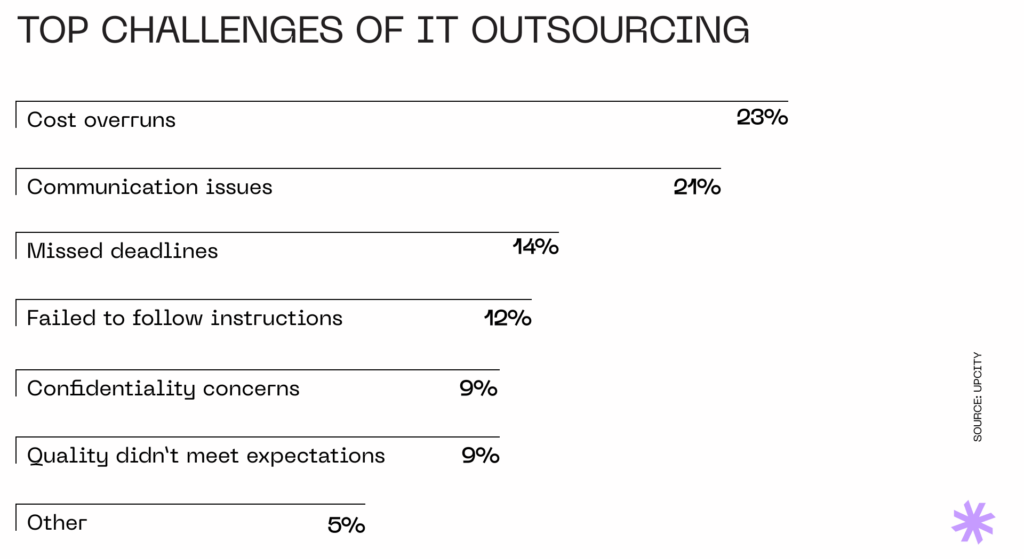
Lack of shared vision
Outsourced teams may not fully understand your company’s mission, long-term goals, or product vision. This disconnect can lead to misaligned priorities or solutions that don’t support your business strategy.
How to solve it:
- Invest time in onboarding. Don’t just hand over specs: share your mission, roadmap, user goals, and business context.
- Include external Python developers in strategic planning. When possible, involve your outsourcing vendor in product discussions, backlog grooming, and roadmap reviews.
- Build a long-term relationship. Working with the same team across milestones builds ownership, context, and loyalty.
Unclear scope and evolving requirements
Without a well-defined scope, outsourced developers may work toward goals that shift—or worse, were never clear to begin with.
How to solve it:
- Start with a Discovery phase. Define business goals, user needs, technical constraints, and success metrics together with your Python software development partner.
- Break work into milestones. Use a milestone-based approach to track progress and keep scope under control.
- Document and validate assumptions early. Misunderstandings around features, edge cases, or integrations can derail velocity.
Lack of accountability
Sometimes, outsourced teams don’t feel the same sense of ownership as internal employees, especially if roles and responsibilities aren’t clearly defined.
How to solve it:
- Assign a project manager on your side. They’ll serve as the main point of contact, keep communication flowing, and maintain alignment.
- Use integrated teams. At Syndicode, we often provide a full delivery team—including a PM, developers, quality assurance, and business analysts—all trained to take responsibility for outcomes.
- Build in QA and feedback loops. Regular code reviews, automated tests, and acceptance criteria keep quality high and responsibility clear.
Communication gaps and time zone misalignment
Delays and misunderstandings often stem from asynchronous workflows and unclear communication routines between your in-house team and a Python development services provider.
How to solve it:
- Set up structured communication. Use shared tools (like Slack, Jira, Confluence, Notion) and establish predictable syncs.
- Overlap working hours. At Syndicode, our teams adjust their schedules to maintain overlap with your core hours, especially during critical phases.
- Use shared documentation. Meeting notes, decisions, and goals should be written down, not just spoken.
Technical misalignment
If your tech stack, workflows, or architecture expectations don’t match the outsourced team’s capabilities, the result can be messy handoffs or rework.
How to solve it:
- Validate technical fit early. Review the outsourcing provider’s experience with relevant Python frameworks, integrations, performance needs, and scalability.
- Start with a small pilot. A short PoC or sprint helps assess whether the team understands your system and tech standards before full commitment.
- Define a shared approach. Agree on conventions, branching strategies, CI/CD workflows, and documentation expectations upfront.
How Syndicode avoids these pitfalls
At Syndicode, we build these preventive steps into every engagement:
- Our Discovery phase ensures we understand your product, business, and technical priorities before coding starts.
- We provide complete teams (developers, PMs, QAs, and BAs) tailored to your project’s complexity.
- We help you set up tools, define communication cadences, and maintain clear visibility into progress.
- We prioritize long-term thinking and transparency, so you always know where your software development project stands and where it’s headed.
Let’s talk Python
Not sure where to start? Have questions about outsourcing, team setup, or how to avoid common pitfalls? Schedule a free 15-minute call with our experts. We’ll discuss your goals, explore the best cooperation model for your needs, and help you make an informed next step.
Book a callThe future of Python outsourcing
As we look ahead, Python outsourcing is poised to play an even more pivotal role in driving innovation and efficiency for tech companies. Several key trends are shaping this landscape:
1. AI-driven outsourcing partnerships
Python development outsourcing is evolving beyond traditional cost-saving measures. According to IBM AI in Action, 84% of businesses augment their in-house teams with help from third-party vendors, who can leverage advanced technologies, particularly artificial intelligence, to enhance efficiency and innovation. This shift enables businesses to focus on strategic growth while partners handle complex technical implementations.
2. Python’s expanding role in emerging technologies
Python continues to rise in the TIOBE Index of programming language popularity, thanks to its dominant role in fields like AI, machine learning, data science, and the Internet of Things. Its simplicity and versatility make it a preferred choice for developing complex applications across various industries.
3. Global collaboration and diverse talent pools
While the wave of tech layoffs has slowed since 2023, cost optimization remains a top priority for many companies. Outsourcing, particularly through managed service providers, continues to be a strategic way to access global talent and reduce operational costs. As a result, we expect Python development outsourcing to grow even further, especially for teams looking to scale without expanding in-house headcount.
At Syndicode, we align with these future-focused trends by offering:
- AI-enhanced development services: Integrating AI tools to streamline development processes.
- Expertise in Python and related technologies: Leveraging Python’s capabilities in AI, ML, and IoT applications.
- Global talent acquisition: Building diverse teams to bring innovative solutions.
- Strategic collaboration: Fostering long-term partnerships focused on shared success.
By embracing these trends, we help our clients stay ahead in the rapidly evolving tech landscape.
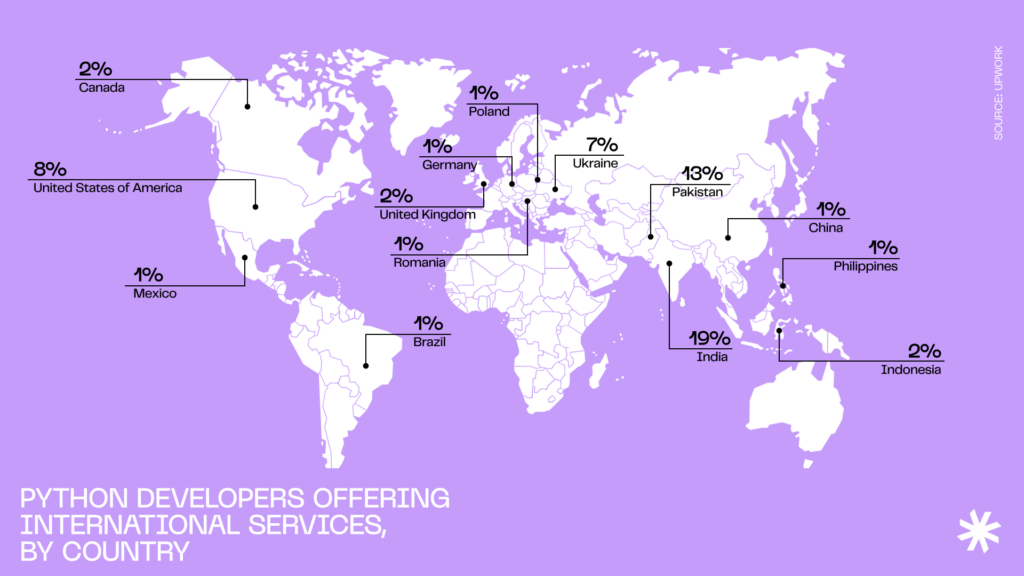
Why outsource with Syndicode?
At Syndicode, we don’t just fill talent gaps; we bring deep technical expertise, proven processes, and long-term thinking to every engagement.
Here’s why companies trust us with their most critical Python projects.
Full-cycle Python services, tailored to your needs
We offer a wide array of Python software development services that adapt to your project’s goals, complexity, and growth stage:
- Custom web and mobile applications using Django, FastAPI, and Flask
- Data science solutions, including data analysis, modeling, and visualization
- AI and machine learning model development, including generative AI development with TensorFlow, PyTorch, and scikit-learn
- Cloud automation and DevOps, including CI/CD pipelines
- Process automation and scripting to streamline operations
- Legacy system modernization and migration to scalable Python-based architectures
- API development and third-party integrations
Whether you need to build a new product, modernize an existing system, or enhance internal workflows, we have the tools and the team to help you move faster and smarter.
Team that feels like an extension of yours
Our clients often say they don’t just “hire developers,” they gain a proactive, reliable tech partner.
What sets our Python development services apart:
- Engineers with deep technical experience and product awareness
- Dedicated project managers who ensure clarity, momentum, and accountability
- Business analysts and quality assurance specialists to keep delivery aligned with outcomes
- A collaborative approach that values transparency, autonomy, and communication
We don’t believe in one-size-fits-all outsourcing. Every engagement is tailored, from team structure to communication cadence, so we fit seamlessly into your workflow.
Company built on values that drive results
Syndicode isn’t a vendor: we’re a long-term partner. Our culture is built around values that support sustainable, high-impact software delivery:
- Proactive thinking: we don’t wait to be told what to do
- Accountability: we own outcomes, not just tasks
- Clarity and communication: because smooth delivery depends on it
- Innovation with focus: we think critically but never lose sight of your goals
These aren’t just words; they show up in how we scope projects, write code, and communicate with your team.
Real results: Maxwell’s platform built with Python
When Maxwell, a marketplace for architectural building products, needed to build a scalable, data-driven platform from the ground up, they partnered with Syndicode.
We provided end-to-end development, delivering:
- A powerful backend using Django
- Advanced admin tools for content management
- A fast, responsive frontend
- Workflow automation that improved operational efficiency
The result? 200% more effective resource utilization, a better experience for Maxwell’s clients, and a platform that scales with their growth.
This is just one example of how we turn raw ideas and raw data into working products that make business sense.
For a closer look at what we do, visit our Projects page.
If you have questions about Python development outsourcing or want to discuss your specific needs, get in touch. Our team is ready to help you achieve your business goals with reliable, scalable, and tailored Python solutions.
Frequently asked questions
-
What are the best outsourcing companies for Python?
While rankings may vary, five consistently recognized Python outsourcing companies include: / Syndicode – known for tailored solutions, strong communication, and long-term partnerships. / STX Next – Europe’s largest Python-focused software house. / BairesDev – offers broad engineering expertise with global coverage. / Toptal provides access to a curated network of Python freelancers. / N-iX delivers enterprise-grade development at scale. These leading companies are praised for quality engineering, process maturity, and experience in Python-based platforms across industries like fintech, e-commerce, and SaaS.
-
Where to look for an outsourcing partner?
Start by exploring reputable platforms like Clutch, GoodFirms, and Upwork to compare vetted firms and read verified reviews. LinkedIn and GitHub also offer valuable insights into company culture, tech stacks, and community involvement. For highly specialized Python talent, consider searching through curated networks like Toptal. Attending industry events, joining tech forums, or asking for referrals in founder/CTO communities can also surface trusted partners. Ultimately, choose a Python development services provider that aligns with your project goals, communication style, and long-term vision, not just hourly rates.
-
How much does it cost to outsource Python development services?
Generally speaking, creating a software product can range from under $50K to over $200K. This wide range depends on several key factors: Project complexity: Smaller projects require less time and expertise, while larger, more complex projects—like those involving generative AI development, data science, or enterprise solutions—come with higher costs due to advanced skill sets, longer hours, and larger teams. Developer expertise levels: Junior developers typically charge $20–$40 per hour for basic tasks, such as automating routine processes. Senior specialists, on the other hand, charge $70–$150 per hour or more, offering advanced expertise in AI and machine learning, and complex system design. Location of the development team: Developer rates vary by region. For example, a mid-level Python developer in Eastern Europe typically charges $35–$70 per hour, while their counterpart in North America tends to charge double that.
-
How to ensure effective communication with outsourced Python developers?
To ensure effective communication when outsourcing Python development, set up clear channels using tools like Slack, Zoom, or Microsoft Teams, and establish a regular meeting schedule. Use project management tools like Jira or Trello to keep everything transparent and track tasks. If you’re working across time zones, make sure there’s some overlap in working hours, and appoint a dedicated project manager to oversee communication. Lastly, document goals, timelines, and feedback clearly to keep everyone aligned.
-
Should I outsource Python or choose outstaffing?
Choose outsourcing if you want a full solution managed externally, covering everything from planning to development and project management. Go for outstaffing if you need to hire remote Python developers with specific Python expertise to strengthen your in-house team while retaining control over the project.
-
Which Python projects should never be outsourced?
While many development tasks can be outsourced effectively, some are better kept in-house, especially when they involve proprietary knowledge or tight strategic alignment. R&D projects, internal company tools, and core proprietary software often require close collaboration, rapid iteration, and a deep understanding of company culture and goals. These are hard to replicate externally. However, Python development outsourcing can still support these efforts by handling non-core components like UI, front-end, QA, or early prototypes. This hybrid approach allows your internal team to retain control over sensitive areas while still benefiting from the speed, flexibility, and cost-efficiency of outsourced development.
-
How is Python different from other programming languages?
Python stands out for its readability, versatility, and massive ecosystem. Unlike lower-level languages like C++ or performance-heavy options like Java, Python is designed for rapid development and simplicity, making it ideal for startups and scalable enterprise solutions alike. It excels in areas like web development, AI/ML, data science, and automation—thanks to robust libraries such as Django, TensorFlow, and Pandas. Python’s clean syntax shortens development time and lowers the barrier for collaboration between developers and stakeholders, making it a top choice for projects that value speed, clarity, and long-term maintainability.
